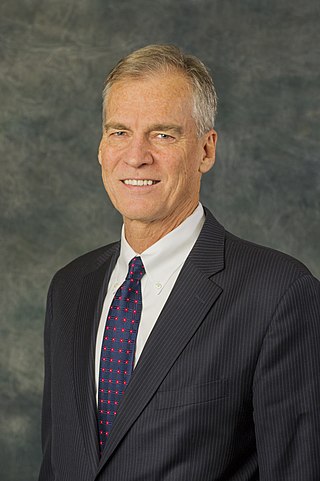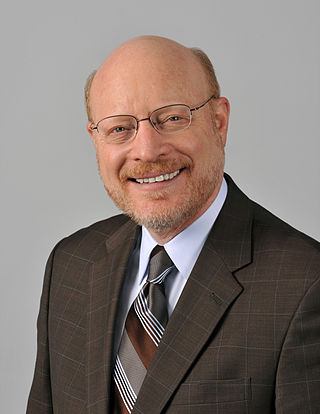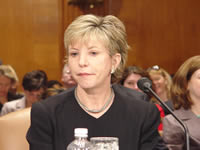
AARP, formerly the American Association of Retired Persons, is an interest group in the United States focusing on issues affecting those 50 years old and older. The organization, which is headquartered in Washington, D.C., said it had more than 38 million members as of 2018. The magazine and bulletin it sends to its members are the two largest-circulation publications in the United States.

The Cigna Group is an American multinational for-profit managed healthcare and insurance company based in Bloomfield, Connecticut. Its insurance subsidiaries are major providers of medical, dental, disability, life and accident insurance and related products and services, the majority of which are offered through employers and other groups. Cigna is incorporated in Delaware.
The Clinton health care plan of 1993, colloquially referred to as Hillarycare, was an American healthcare reform package proposed by the Bill Clinton administration and closely associated with the chair of the task force devising the plan, first lady Hillary Clinton. Bill Clinton had campaigned heavily on health care in the 1992 United States presidential election. The task force was created in January 1993 but its own processes were somewhat controversial and drew litigation. Its goal was to come up with a comprehensive plan to provide universal health care for all Americans, which was to be a cornerstone of the administration's first-term agenda. The president delivered a major health care speech to the U.S. Congress in September 1993, during which he proposed an enforced mandate for employers to provide health insurance coverage to all of their employees.

Karen Emily Tumulty is a political columnist for The Washington Post. Tumulty wrote for Time from October 1994 to April 2010 as a Congressional Correspondent, she was the National Political Correspondent based in Washington D.C. for the magazine.

Blue Cross Blue Shield Association, also known as BCBS, BCBSA, or The Blues, is a United States–based federation with 33 independent and locally operated BCBSA companies that provide health insurance to more than 115 million people in the U.S. as of 2022.

Mark Vincent Parkinson is an American businessman and former politician serving as head of the American Health Care Association (AHCA) and National Center for Assisted Living (NCAL). He served as the 47th lieutenant governor of Kansas from 2007 to 2009 and the 45th governor of Kansas from 2009 until 2011. He was also a state legislator.

Jason Altmire is an American businessman, author, lobbyist and politician. He is the former Democratic U.S. Representative for Pennsylvania's 4th congressional district, serving from 2007 until 2013.

Freelancers Union is a nonprofit organization based in New York City that provides advocacy, programming and curated insurance benefits for freelancers through partnerships. The organization dessiminates information through monthly meetings. Rafael Espinal became executive director and president in January 2020.

Charles N. ("Chip") Kahn III is the president and chief executive officer of the Federation of American Hospitals (FAH), whose member companies own nearly 20 percent of all American hospital beds. Kahn and the FAH represent their members on health policy issues like health care reform and hospital care quality improvement.

The Alliance for Retired Americans (ARA) is a 501(c)(4) non-profit organization and nonpartisan organization of retired trade union members affiliated with the AFL-CIO, which founded it in 2001. The group's membership also includes non-union, community-based activists. Its predecessor organization was known as the National Council of Senior Citizens (NCSC).
Angela Fick Braly is an American executive. She served as president and chief executive officer of WellPoint, a large U.S.-based provider of health insurance, and was a member of the company's board of directors. She assumed those responsibilities on June 1, 2007, following several high-profile roles for the company. She resigned in August 2012 due to shareholder criticism. Since May 2016, she has been a member of the board of directors of ExxonMobil.
In the United States, health insurance helps pay for medical expenses through privately purchased insurance, social insurance, or a social welfare program funded by the government. Synonyms for this usage include "health coverage", "health care coverage", and "health benefits". In a more technical sense, the term "health insurance" is used to describe any form of insurance providing protection against the costs of medical services. This usage includes both private insurance programs and social insurance programs such as Medicare, which pools resources and spreads the financial risk associated with major medical expenses across the entire population to protect everyone, as well as social welfare programs like Medicaid and the Children's Health Insurance Program, which both provide assistance to people who cannot afford health coverage.

Heather Bresch is an American business executive. In 2012, she was named as the chief executive officer (CEO) of Netherlands-based pharmaceutical company Mylan, becoming the first woman to run a Fortune 500 pharmaceutical company. Bresch retired in 2020, upon the closing of Mylan’s combination with Upjohn. Bresch has been a central figure in two controversies: a 2007 accusation of inflating her resume with an unearned MBA degree, and as the CEO of Mylan during the 2016 controversy over pricing of the company's EpiPen products. In 2015, she was listed as #22 in Fortune magazine's “Most Powerful Women” list.
In the context of healthcare in the United States, a pre-existing condition is a medical condition that started before a person's health insurance went into effect. Before 2014, some insurance policies would not cover expenses due to pre-existing conditions. These exclusions by the insurance industry were meant to cope with adverse selection by potential customers. Such exclusions have been prohibited since January 1, 2014, by the Patient Protection and Affordable Care Act.

Mary Kay Henry is an American labor union activist who was International President of the Service Employees International Union (SEIU) from May 8, 2010 until her retirement on May 20, 2024. She was the first woman to lead the union. While serving with the union in California, she helped pioneer SEIU's use of card check agreements, non-traditional collective bargaining agreements, comprehensive campaigns, and system-wide health care organizing strategies. Henry was included on Time's 100 Most Influential People of 2020.

Mark T. Bertolini is an American businessman who is currently the CEO of Oscar Health, a tech-driven health insurance company located in New York. He was the co-CEO of Bridgewater Associates, one of the world's largest hedge funds, and was previously the CEO of Aetna, a Fortune 50 diversified health care benefits company with over $60 billion in 2015 revenue. Bertolini assumed the role of CEO on November 29, 2010 and of chairman on April 8, 2011, until Aetna was sold to CVS on November 28, 2018.
Karen Davis is president of The Commonwealth Fund, a national philanthropy engaged in independent research on health and social policy issues. Davis is an economist, with a career in public policy and research. Before joining The Commonwealth Fund, she served as chairman of the Department of Health Policy and Management at The Johns Hopkins School of Public Health, where she also held an appointment as professor of economics. She served as deputy assistant secretary for health policy in the Department of Health and Human Services from 1977–1980, becoming the first woman to head a U.S. public health service agency.

Laura A. Fortman is an American government employee, non-profit executive, and women's rights activist. Since 2013 she has served as deputy administrator of the Wage and Hour Division at the United States Department of Labor in Washington, D.C. Previously she was commissioner of the Maine Department of Labor, and executive director of the Frances Perkins Center, the Maine Women's Lobby, and the Sexual Assault Crisis and Support Center of Augusta. She was inducted into the Maine Women's Hall of Fame in 2007.
Lois Elaine Quam is an American executive who has worked in the public and the private sectors to expand access to health care. She was named three times to FORTUNE's list of the most influential women leaders in business. She has also served as a top leader at a major nonprofit organization dedicated to preserving the environment.

Karen S. Lynch is an American businesswoman and the former president and chief executive officer (CEO) of CVS Health. Lynch is on the board of directors of AHIP and previously CVS Health and U.S. Bancorp. In 2015, she became the first female president of Aetna. She has held executive positions at Magellan Health Services and Cigna. In 2021, she became the highest-ranking female chief executive on the Fortune 500 list. She is a member of the President's Export Council, The Business Council, and the Business Roundtable.














